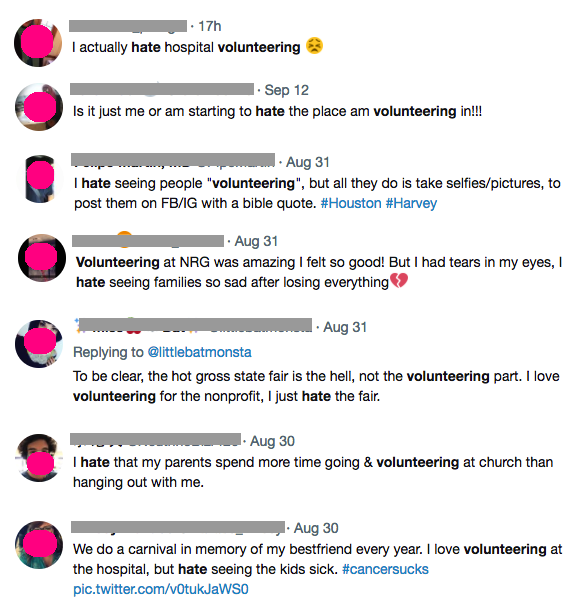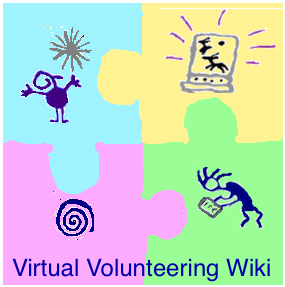 Your program’s volunteers talk online about their experiences with your organization.
Your program’s volunteers talk online about their experiences with your organization.
YES, THEY DO!
Did you feel that chill in the air? It was generated by managers of volunteers at nonprofits, government agencies, schools and more going cold at the realization that there may be negative comments by volunteers on Facebook and Twitter about their frustrations with the organization, about program incompetence, and more. It’s a chill I always feel when I do workshops and I bring up the topic of volunteers and social media. And I admit, I am always amused by the reaction.
I love to read what volunteers write unofficially about their volunteering work. I don’t mean official blogs by volunteers done under the auspices of the organization (though I do often enjoy those as well); I mean the writing that the volunteer does on his or her own blog space or on social media, the posts where he or she isn’t doing a PR piece for the organization with nothing but glowy, happy thoughts, and maybe a vague, “It was challenging, but I learned a lot” comment.
I also go on Twitter sometimes and do searches for these phrases:
- hate volunteering
- bored volunteer
- volunteer PDX
- volunteer Portland Oregon
I find some rather interesting things when I do searches for those phrases. Here are some examples from looking for hate volunteering on Twitter:

Interesting stuff!
So, what if you tried it with the name of your organization, or your city, on Twitter or Facebook, or just Google or Bing in general?
How else do you know what is being said about your organization or yourself in the public spaces online — on blogs, in captions on Flickr photos, in newspaper articles, and in public online discussion groups?
My favorite tool for tracking what’s being said about an organization I’m working with, or even just me, is GoogleAlerts. This free service automatically notifies you if there is any new content online in a public space — including traditional print media that publishes their stories online — that mentions whatever phrase or phrases you want to track. It won’t tell you about email conversations, as those are private, or about postings on private online spaces (a private online discussion group, for instance, or someone’s Facebook profile that has all of its privacy settings on — so long as Facebook keeps allowing such privacy settings, which it may not always do).
You can use GoogleAlerts or similar tools to track:
- Your name
- Your organization’s name
- Your executive director’s name
- Another organization (your competition, a partner, an organization you aspire to be like, etc.)
- A particular subject matter
- Etc.
Start with two GoogleAlerts at first — one of just your name, and one of your organization’s name. Putting a name in quotes is best, so that you will get only exact matches (I don’t want every newspaper story that mentions Jayne and also Cravens, but specifically, Jayne Cravens, and that won’t happen unless I put my entire name in quotes, like this: “Jayne Cravens”). You will then receive an email when something is published online with your alert name, with a link to the mention. You can set the alerts to come as the mentions happen (for instance, when the blog is posted that mentions your name), in a daily summary, or in a weekly summary.
If you find anything being said about volunteering at your organization by doing these searches, you probably won’t find negative things – you are much more likely to find positive things, even heart-warming things. Whether negative or positive, remember that you don’t have a right to tell volunteers to not share such opinions, so long as they are staying within your organization’s confidentiality and security policies.
You can choose how to react to finding feedback about your organization online. If it’s negative, is it also true? Is the comment bringing up a management or training problem that actually needs to be addressed? If the comment is positive, could it be turned into something more official for your organization, like an official blog for your organization, or a testimonial to put in a newsletter or on your web site?
As for me, when I go searching for volunteer voices online, I love it when I find blogs where I hear about the fears, the frustrations and the mistakes by volunteers, when I hear about what they’ve learned and what they lack and what they wish was different. I also love the nitty gritty — not just, “I arrived at the site at 3” but “I had to bribe three officials to get into the work site.”
I go looking for these unofficial blogs from time-to-time. Here are two I found:
Here’s one I found via the volunteer forum on Reddit: a woman in Maryland is trying to volunteer once-a-week for a full year at a “one-time” volunteer event, every week from September 10, 2017 to September 9, 2018. She has set rules for herself: she can’t repeat benefitting organizations even if the event is different from one she’s volunteered for before, she can’t take time off specifically to volunteer, and she cannot mention this project in an attempt to be guaranteed a volunteer position at an event. She’s also a volunteer manager at a Meals on Wheels – imagine what she’s learning re: volunteer management! Her posts are super positive – at least the 10 or so I read. I wonder if any of the organization’s she’s helping know about these wonderful blogs.
I would love to find more of these types of independent blogs written by volunteers, not under the official auspices of the organization they are helping. I would love it if more volunteers produced these types of blogs: they are honest voices we need to hear.
What I would also love to see is more volunteers talking about their experiences with specific nonprofits on Yelp, probably the most popular web site for customer reviews of businesses. I would especially love to hear from volunteers who pay companies to volunteer abroad, sharing about their experience via Yelp. Finding organizations you can pay in order to participate in a short-term, feel good volunteering experience abroad is easy; finding out if they are credible is much harder. This situation will improve only if people who have paid to volunteer review the organizations they worked with in a public forum like Yelp, or on a blog of their own (More on volunteering abroad).
Here is an official blog by a volunteer, Jasmin Blessing, a UN Volunteer with UN Women in Ecuador. It is a really nice example of what effective volunteering abroad looks like. Surely YOU have a volunteer among your ranks that could offer their insights about working with your organization?
Also see:
Still Trying to Volunteer, Still Frustrated
How to Handle Online Criticism
 Crowdsourcing is an open, public call for contributions from anyone to talk about a pressing issue, offer advice or data or to help solve a problem or challenge. It’s an open-call brainstorming session. While the term crowdsourcing was popularized online to describe Internet-based activities, there are examples of projects that, in retrospect, can also be described as crowdsourcing, without the Internet.
Crowdsourcing is an open, public call for contributions from anyone to talk about a pressing issue, offer advice or data or to help solve a problem or challenge. It’s an open-call brainstorming session. While the term crowdsourcing was popularized online to describe Internet-based activities, there are examples of projects that, in retrospect, can also be described as crowdsourcing, without the Internet. Online crowdsourcing is one example of virtual volunteering. Wikipedia is probably the most well-known example of online crowdsourcing, but there are many more. For advice on working with remote volunteers, or using the Internet to support and involve volunteers, whether in crowdsourcing initiatives or in more formal, higher-responsibility volunteering, check out The Last Virtual Volunteering Guidebook. It’s written by myself and Susan J. Ellis, and is the result of many, many years of research and experience.
Online crowdsourcing is one example of virtual volunteering. Wikipedia is probably the most well-known example of online crowdsourcing, but there are many more. For advice on working with remote volunteers, or using the Internet to support and involve volunteers, whether in crowdsourcing initiatives or in more formal, higher-responsibility volunteering, check out The Last Virtual Volunteering Guidebook. It’s written by myself and Susan J. Ellis, and is the result of many, many years of research and experience.







